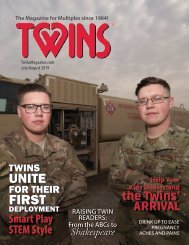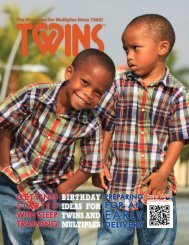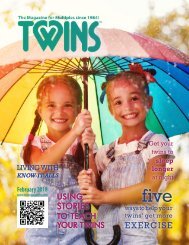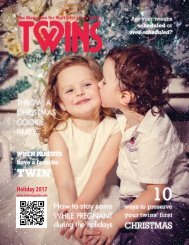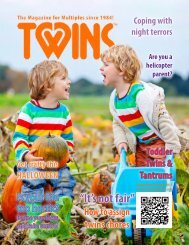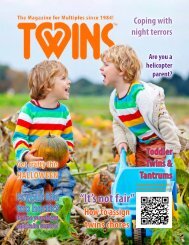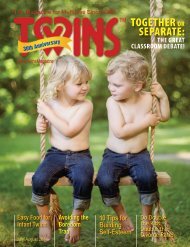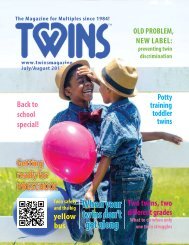Twins Magazine 2004 January February
Canadian family with four sets of twins sets Hardwired to Connect HMO forced to pay for TTTS surgery Holiday Survival Guide Oh my word! RSV season symptoms and strategies Sparkling Snowflakes The best-laid plans The hamster project Those “loving feelings” are hard to find Twins galore Two treatments help TTT babies Uh-oh! Toddler Trials and Training What causes monozygotic twinning Whining wears on single mom Help! I need somebody…
Canadian family with four sets of twins sets
Hardwired to Connect
HMO forced to pay for TTTS surgery
Holiday Survival Guide
Oh my word!
RSV season symptoms and strategies
Sparkling Snowflakes
The best-laid plans
The hamster project
Those “loving feelings” are hard to find
Twins galore
Two treatments help TTT babies
Uh-oh! Toddler Trials and Training
What causes monozygotic twinning
Whining wears on single mom
Help! I need somebody…
You also want an ePaper? Increase the reach of your titles
YUMPU automatically turns print PDFs into web optimized ePapers that Google loves.
Chores for stages and ages
Chores are a great way for twins to learn teamwork in the
early years. They can share a chore, perform compatible
chores or completely unrelated chores—depending on
whether they work best together, in parallel or solo.
2 years old
Pick up toys
Wipe up spills
3 years old
Set table
Carry dishes to the sink
4 years old
Rinse vegetables
Unpack groceries
5 years old
Make bed
Feed pets
Sort clothes by color
Add ingredients to batter,
stir batter
Put away clean clothes
Help wash car
Clear the table
Dust
You, me or we?
Multiples become aware that they are separate people when
they are about 18 months old. From then on, they push and
pull, fight and embrace, retreat and advance in their search
for individual identity.
At the Colorado Parents of Multiples convention, Dr.
Eileen Pearlman of Santa Monica, Calif., co-author of Raising
Twins: What Parents Want to Know and What Twins Want to
Tell Them, summed up how multiples perceive themselves
and each other.
From birth to 3 months old. Twins have a complete awareness
of each other, but without any sense of separateness.
About 7 months old. They
see each other as mirror ...they push and
images, but not as separate
pull, fight and
beings.
About 11 months old. Babies embrace, retreat
become interactive and begin
vocalizing and responding to
and advance
each other’s audible cues. They in their search
may also suck on each other’s
fingers and seek and give comfort
to each other.
for individual
identity.
About 12 to 14 months.
Twins begin to copy each other’s behavior.
About 15 months. They begin to provoke each other in
playful ways and engage in mutual play. This is the beginning
of recognition that they are separate people.
About 16 to 24 months. Twins and higher order multiples
begin the separation process and learning to share. They may
express this physically and may begin to push and bite.
Toss the syrup
A staple of the medicine cabinet, syrup of ipecac, is no longer
considered the antidote every mother needs for a possible
poisoning. In a reversal of a longstanding
policy to give syrup of ipecac to children who
have swallowed certain poisons, the
American Academy of Pediatricians now
advises against it. Although the AAP recommended
consulting a poison control center before using
ipecac, parents often didn’t follow that advice. Outcomes were
not any better for children who received the antidote at home
than for those who were taken to a emergency room.
Furthermore, because ipecac often lingered in the stomach
and could cause prolonged vomiting without always completely
emptying the stomach, children frequently threw up
other antidotes. The U.S. Food and Drug Administration may
halt over-the-counter ipecac sales.
Post the poison control phone number, (800) 222-1222,
near your phone and call 9-1-1 if your child has convulsions,
stops breathing or is unconscious.
Abigail and Heather, 2 1 ⁄2 years old
Love talk
Heather and Abigail, 2 1 ⁄2, are language delayed and receive
weekly therapy to increase their vocabularies. Among the
many things I work on to help their speech are three little
words every mother wants to hear: “I love you.” Every day
I said that phrase, but they never did. One day my motherin-law
was over and we were giving the girls a bath. When
Abigail got out, she looked at me and said,“I love mommy.”
Idon’t think I ever have smiled so proudly. Tears filled my
eyes; I felt so special. She then said, “I love Heather, I love
Tyler (her 6-month-old brother), I love Grammie.” It was
such a great moment. Abigail ended with “I love tub.” I was
still so proud. And we all had a good laugh.
—Julie Reissner, Montvale, N.J.
www.TwinsMagazine.com JANUARY/FEBRUARY 2004 35





